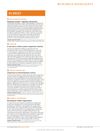Search
for
Sort by
Research
390-420 / 1000+ results
research Vitamin D Receptor: New Assignments for an Already Busy Receptor
The vitamin D receptor is involved in multiple body functions beyond calcium regulation, including immune response and rapid reactions not related to gene activity.

research Antiandrogen Drugs Lower Serum Prostate-Specific Antigen Levels in Hirsute Subjects: Evidence That Serum PSA Is a Marker of Androgen Action in Women
Antiandrogen drugs can reduce PSA levels in women with excess hair, suggesting PSA is a sign of male hormone activity in women.

research Treatment of Androgen Excess in Females: Yesterday, Today, and Tomorrow
The document concludes that treating androgen excess needs patience, managing expectations is important, and many drugs used are not officially approved, suggesting cosmetic options for mild cases.

research Therapeutic Control of Androgen Action
Understanding how androgens work is key for creating new treatments for prostate issues and hair/skin conditions.

research Androgen Metabolism as It Affects Hair Growth in Androgenetic Alopecia
Androgens, like DHT, affect hair growth and treatments like finasteride may help.

research Targeting Receptor–Regulator Interactions
New treatments for cancer and skin disorders show promise in disrupting harmful cell interactions and promoting hair growth.

research Recovery Effects of Active Oxygen Scavengers on Murine Hair Follicle-Derived Keratinocyte Proliferation Suppressed by Androgen
Active oxygen scavengers can reverse the suppression of hair cell growth caused by androgens.

research Fetal Programming of Polycystic Ovary Syndrome by Androgen Excess: Evidence from Experimental, Clinical, and Genetic Association Studies
Exposure to too much androgen before birth might cause polycystic ovary syndrome later in life.

research Androgen-Inducible TGF-β1 from Balding Dermal Papilla Cells Inhibits Epithelial Cell Growth: A Clue to Understanding Paradoxical Effects of Androgen on Human Hair Growth
Androgens may cause hair loss by increasing TGF-beta1 from scalp cells, which inhibits hair cell growth.

research Potential Targets in the Discovery of New Hair Growth Promoters for Androgenic Alopecia
The document concludes that targeting 5α-reductase, the androgen receptor, and hair growth genes, along with using compounds with anti-androgenic properties, could lead to more effective hair loss treatments.

research What Does Androgenetic Alopecia Have to Do with COVID-19? An Insight into a Potential New Therapy
Androgenetic alopecia linked to COVID-19 severity; drugs reducing androgen receptor activation may help.

research Basics of Androgen Synthesis and Action
Androgens like testosterone are important hormones for both men and women, made differently in each sex and affecting the body by regulating genes and quick interactions with cell components.

research Inhibition of Hair Growth by Testosterone in the Presence of Dermal Papilla Cells from the Frontal Bald Scalp of the Postpubertal Stumptailed Macaque
Testosterone can slow down hair growth when combined with certain cells from bald scalps, and this effect can be blocked by an androgen receptor blocker.

research Glucocorticoid Receptor Mutants Demonstrate Increased Motility Inside the Nucleus of Living Cells: Time of Fluorescence Recovery After Photobleaching Is an Integrated Measure of Receptor Function
Certain defective glucocorticoid receptor mutants move faster inside cell nuclei and work less effectively.

research Hepatic Adenoma in an Adolescent With Elevated Androgen Levels
A teenage girl with high androgen levels and PCOS developed a rare liver tumor, suggesting a possible link between high androgens and the tumor's growth.

research Hormonal Activity in Commonly Used Black Hair Care Products: Evaluating Hormone Disruption as a Plausible Contribution to Health Disparities
Common Black hair care products may affect hormone levels and potentially impact health, especially in reproductive and metabolic areas.

research Targets to Treat Androgen Excess in Polycystic Ovary Syndrome
The conclusion is that while oral contraceptive pills are effective for PCOS-related high androgen levels, new treatments with fewer side effects are needed.

research Molecular Basis of Androgen Action on Human Sexual Desire
Testosterone significantly affects sexual desire in both men and women, but its impact on women is more complex and influenced by psychological factors.

research Histopathological Findings and Proliferative Activity of Canine Sebaceous Gland Tumors with a Predominant Reserve Cell Population
High proliferative activity and peripheral invasion indicate malignancy in canine sebaceous gland tumors; the term 'epithelioma' should be updated for clarity.

research Biological Profile of Cortexolone 17a-Propionate (CB-03-01), a New Topical and Peripherally Selective Androgen Antagonist
CB-03-01 is a promising skin cream for treating hormone-related skin problems without causing harmful body-wide effects.

research Expression and Cellular Localization of Keratinocyte Growth Factor and Its Receptor in Human Hyperplastic Prostate Tissue
KGF and its receptor are found in enlarged prostate tissue and KGF strongly increases cell growth.

research Androgen Excess: A Hallmark of Polycystic Ovary Syndrome
Excess androgens may cause PCOS, not just be a symptom.

research Androgen Effects on the Skin
Androgens like testosterone affect skin health and can lead to conditions such as acne and hair loss, with various treatments available.

research Oxidative Activity of the Type 2 Isozyme of 17β-Hydroxysteroid Dehydrogenase Predominates in Human Sebaceous Glands
The enzyme 17β-HSD type 2 mainly performs oxidation in human sebaceous glands, which may help protect against acne.

research Local and Systemic Reduction by Topical Finasteride or Flutamide of Hamster Flank Organ Size and Enzyme Activity
Topical finasteride and flutamide reduce gland size and enzyme activity, with flutamide being more potent, potentially treating acne, seborrhea, hirsutism, and androgenic alopecia.

research Expression of Type 1 5α-Reductase and Metabolism of Testosterone in Reconstructed Human Epidermis: A New Model for Screening Skin-Targeted Androgen Modulators
The study created a new method to test drugs that affect hormone processing in skin.

research The Evaluation and Treatment of Androgen Excess
High androgen levels can cause excessive hair growth and may indicate serious health issues, including heart disease and fertility problems.

research Recent Advances in Drug Design and Drug Discovery for Androgen-Dependent Diseases
New treatments for prostate cancer and BPH show promise, including novel compounds that target hormone synthesis and response.
research Mechanism of Action of Androgen in Hair Follicles
Testosterone affects hair follicles differently across body sites, with beard hair follicles showing more activity of a specific enzyme and presence of androgen receptors compared to scalp hair.